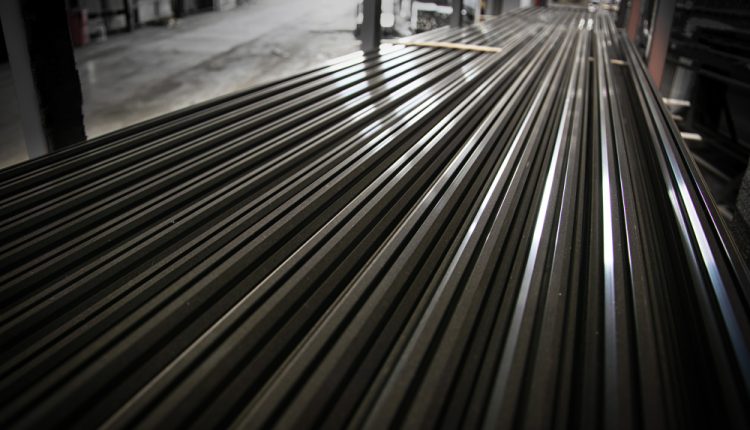Carbon steel, an alloy composed primarily of iron and carbon, is one of the most widely used materials in various industries. Its exceptional characteristics, combined with its affordability, make it a top choice for a multitude of applications. Carbon steel possesses several key characteristics that set it apart from other materials. From its strength and malleability to its resistance to corrosion, these attributes make it highly desirable for a wide array of applications. Explore the essential characteristics of carbon steel and its numerous applications.
Characteristics and Applications of Carbon Steel

1. High Strength and Durability
Carbon steel exhibits remarkable strength and durability, making it an ideal choice for applications that require robust materials. Due to its high carbon content, carbon steel can withstand heavy loads and resist deformation, making it suitable for construction, infrastructure, and machinery.
2. Versatility and Adaptability
One of the most significant advantages of carbon steel is its versatility. It can be easily molded into various shapes, allowing it to be adapted for different applications. Carbon steel’s adaptability makes it an excellent choice for industries such as automotive, aerospace, and manufacturing, where precision and customization are crucial.
3. Excellent Heat Resistance
It demonstrates exceptional heat resistance, making it suitable for applications involving high temperatures. It can withstand heat without losing its structural integrity, making it an ideal material for components in boilers, heat exchangers, and furnaces.
4. Superior Machinability
With its excellent machinability, it can be easily cut, shaped, and formed, allowing for efficient manufacturing processes. This characteristic makes carbon steel highly sought after in the production of machine components, tools, and equipment.
5. Corrosion Resistance
While carbon steel is not inherently corrosion-resistant, it can be protected against corrosion through various methods, such as coatings and plating. When properly treated, carbon steel becomes resistant to corrosion, making it suitable for applications in marine environments, infrastructure, and pipelines.
6. Cost-Effectiveness
Carbon steel’s affordability and wide availability make it a cost-effective choice for many applications. Compared to other alloys, carbon steel offers a balance between performance and price, making it an economical option for industries ranging from construction to consumer goods.
7. Construction Industry Applications
The construction industry relies heavily on the use of carbon steel due to its exceptional strength and durability. From structural beams and columns to reinforcing bars and concrete reinforcement, carbon steel plays a vital role in ensuring the integrity and stability of buildings and infrastructure.
8. Automotive and Transportation Applications
In the automotive and transportation sectors, carbon steel finds extensive use in various components and systems. It is utilized in the manufacturing of chassis, engine parts, suspension systems, and body frames. Its strength, impact resistance, and cost-effectiveness make it an ideal material for building safe and reliable vehicles.
9. Manufacturing and Machinery Applications
Carbon steel is a preferred choice in the manufacturing and machinery industries due to its excellent machinability and versatility. It is utilized in the production of gears, shafts, bearings, and machine components. Carbon steel’s ability to withstand high loads and resist wear and applied forces ensure the reliability and longevity of machinery and equipment.
10. Oil and Gas Industry Applications
The oil and gas industry relies on carbon steel for various applications, including pipelines, storage tanks, and drilling equipment. Carbon steel’s strength, corrosion resistance (when properly treated), and ability to withstand high-pressure environments make it a suitable choice for this demanding industry.
11. Tools and Cutlery
Carbon steel’s exceptional hardness and edge retention make it a popular choice for tools and cutlery. It is widely used in the production of knives, saw blades, drills, and gardening tools. The ability to maintain a sharp edge and resist wear and tear makes carbon steel an invaluable material for professionals and DIY enthusiasts alike.
12. Electrical Power Generation
Carbon steel plays a significant role in the electrical power generation industry. It is used in the construction of power plant structures, turbine components, and transmission towers. The combination of strength, durability, and heat resistance makes carbon steel essential for supporting and safeguarding the generation and distribution of electricity.
13. Construction Equipment and Machinery
Various types of construction equipment and machinery, such as cranes, bulldozers, and excavators, rely on the robustness of carbon steel. The high strength and impact resistance of carbon steel ensures the durability and safety of these heavy-duty machines, enabling efficient construction operations.
14. Structural Applications
Carbon steel’s high strength-to-weight ratio and excellent load-bearing capacity make it a prime choice for structural applications. From bridges and stadiums to industrial facilities and high-rise buildings, carbon steel provides the necessary support and stability required for large-scale structures.
15. Shipbuilding and Marine Applications
The shipbuilding and marine industries extensively utilize carbon steel due to its ability to withstand harsh marine environments. It is used in the construction of ships, offshore structures, and marine equipment. Carbon steel’s corrosion resistance, coupled with its strength and durability, makes it an indispensable material for maritime applications.
16. Consumer Goods
Carbon steel’s affordability and versatility make it a popular choice for a wide range of consumer goods. It is utilized in the production of appliances, furniture, utensils, and decorative items. Carbon steel’s aesthetic appeal, coupled with its durability, ensures that consumer goods can withstand everyday use and maintain their quality over time.
17. Agricultural and Farming Equipment
The agricultural and farming sectors heavily rely on carbon steel for equipment and machinery. From tractors and plows to irrigation systems and livestock enclosures, carbon steel’s strength and durability ensure the effectiveness and longevity of agricultural operations.
18. Infrastructure and Civil Engineering
Carbon steel’s excellent tensile strength and resistance to external forces make it a crucial material in infrastructure and civil engineering projects. It is used in the construction of bridges, tunnels, highways, and railways. Carbon steel’s ability to withstand heavy loads and harsh environmental conditions ensures the safety and reliability of vital infrastructure.
19. Wire and Cable Manufacturing
Carbon steel wires and cables find use in various industries, including telecommunications, power transmission, and automotive. Carbon steel’s high tensile strength and electrical conductivity make it suitable for carrying electrical currents over long distances with minimal power loss.
20. Springs and Fasteners
Carbon steel’s exceptional elastic properties make it an ideal material for manufacturing springs and fasteners. It is widely used in the automotive, aerospace, and manufacturing industries, where secure and reliable connections are crucial.
Frequently Asked Questions about Carbon Steel
What is the composition of carbon steel?
Carbon steel is primarily composed of iron and carbon, with trace amounts of other elements such as manganese, silicon, and sulfur.
What is the difference between carbon steel and stainless steel?
Carbon steel contains a higher amount of carbon compared to stainless steel. Stainless steel also contains chromium, which provides it with enhanced corrosion resistance. Carbon steel is generally more affordable and has higher strength, while stainless steel offers better resistance to rust and staining.
Can carbon steel be used in high-temperature environments?
Yes, carbon steel can withstand high temperatures without losing its structural integrity, making it suitable for applications in industries such as power generation and furnace manufacturing.
How can carbon steel be protected against corrosion?
Carbon steel can be protected against corrosion through various methods, including the application of protective coatings, such as paint or specialized anti-corrosion coatings, and the use of galvanization or electroplating techniques.
Is carbon steel recyclable?
Yes, carbon steel is highly recyclable. It can be melted down and reused in the production of new steel products, making it an environmentally friendly material choice.
What are the potential drawbacks of carbon steel?
While carbon steel offers numerous advantages, it is important to note that it is not as corrosion-resistant as stainless steel or other alloyed materials. Proper care and maintenance, such as regular inspections and protective coatings, are necessary to prevent corrosion.
Conclusion
Carbon steel, with its exceptional characteristics and versatile applications, continues to be a powerhouse material in various industries. Its high strength, durability, heat resistance, and cost-effectiveness make it a preferred choice for construction, automotive, manufacturing, and many other sectors. From towering structures to everyday consumer goods, carbon steel plays a vital role in shaping the world we live in. Understanding its characteristics and applications empowers us to appreciate its value and make informed choices in utilizing this remarkable material.


